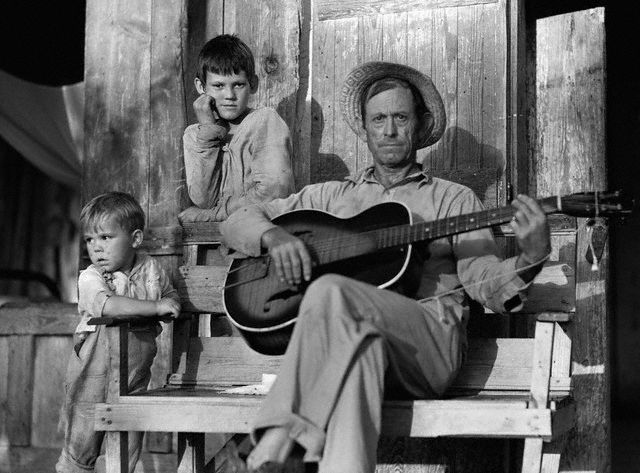Most people probably associate cattle drives with the last century, and the wild West, but out here in Spottswood, in the Shenandoah Valley, there’s a man who’ll tell you different, and he’ll tell you first hand.
“Back in the 20’s we drove ’em in spring, up in the mountains, thirty miles beyond Monterey — right through the streets of Monterey — for the summer, where the pasture’d be good and it was cool; and in the fall we’d drive ’em back down the mountain to the Staunton markets. It’d be about eighty miles; and we’d be goin’ three – four days.”
He tells it matter of fact. Characteristically so. To Mr. J.W.Woods there’s no special glory in the telling, nor romance in the event, just part of something he’s been doing all his life.
Born in Rockbridge Baths, near the turn of the century, Mr. Woods started working at the Silverbrook Farm, near Middlebrook, when his father took on there, and he was still only a boy; and he continued there after his father died, and through all the time of his own children’s births and then upbringing. He remembers that when hard times came, back in the thirties, Mr. Clemmer told them he couldn’t afford to pay more than fifty cents a day, but added that if things got better they’d be paid better. So he stayed. And for a long time afterward he was foreman before the Silverbrook Farm was bought by Mrs. Groves of Texas, and the famous King Ranch family.
Now he no longer works for any one person but for everyone. His tractor and wagon chugging along the road at a creep are a common sight out here around Spottswood and Raphine. When you see him in some neighbor’s field, or off on a back road somewhere, you know someone’s getting something done.
“He’s an old-time hand,” a neighbor of his says, “there aren’t many like him anymore.” And in fact just about anyone around here will testify that Mr. Woods, or Shorty, as some call him, is an indispensable feature of the community.
Fifteen years ago, when he decided to buy the little frame house and ten acres on the Fix Road, close to Grier Carson’s place, with savings from a lifetime of working, he decided then to hire out from day to day. Since then, as Mr. Woods puts it, “I ain’t never had to ask for half-an-hour’s work. It’s always come to me.” So most days, Mr. Woods, who’s a great-grandfather several times over, goes out with his son Charlie, after home chores in the early morning, and depending on the season, he’s building and repairing neighbors’ fences, helping to harvest crops, cutting and hauling firewood, butchering hogs, doctoring sick livestock, plowing up people’s gardens, making and putting in hay, vaccinating calves — just about anything. And that’s not all: with several acres of potatoes planted every year, people, not only from Spottswood but from as far as twenty miles away in Staunton, come to buy Woods & Co. produce. Now, why (I’ve often thought) does Mr. Woods keep to a regimen men half his age flinch at? “I like gettin’ things done,” he says.
But if you can catch him between chores, Mr. Woods likes to talk as well, and mostly about the old times, about old chestnut, for in-stance: “It wasn’t hard; and you could work it easy; and no wood stays in the ground like chestnut; and you could split eleven rails out of one log” — and then a flashing smile directed toward his son Charlie — “if you knew howl”
Or sometimes he talks philosophically, not just about the old times but times in general: “When something goes wrong some folks think it’s people. But there are a lotta things people don’t do that you can’t help no ways!” Or, then, again, eyeing a television aerial atop a neighbor’s house: “Had a television here once but all you had was the same foolishness all the time. Radio’s better because at least you can’t see it.” And finally when son Charlie half-humorously suggests he might put a radio on their tractor, “No, you ain’t! You can hear music in the air if you want to!”
But Mr. Woods’ only real quarrel is with Daylight Savings Time. “Back during the World War, they started this Daylight Savings. Maybe that’s alright for city folks but for a farmer it ain’t no good.” Consequently he has chosen to ignore the time by which everyone else keeps time. But though there’s his time and yours, when he says he’s going to be somewhere, he’s there (though you’d better know which time he’s going by).
But he’s a gentle man, surprisingly gentle for someone who’s struggled so hard all his life — one who lives easily with himself. “I believe in what the good book says, in treating folks fair, the way you want to be treated.” And generous too. If you pay a visit any time, his time or yours, on any evening at harvest, if he likes you (and he likes most people) you’ll come away with a poke full of squash, or corn, or beets, or onions, and that’s because, as he puts it, “I like to grow plenty and give ’em away to folks.” Just as simple as that. With characteristic matter of factness. No further explanations needed.
It’s like the neighbors say, “there aren’t too many like him anymore.” But as long as there are some, I think that this poor battered and betrayed land of ours may yet survive.
This essay was originally published in Southern Partisan magazine.







